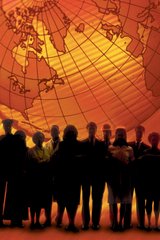After a hectic day that included rushing to planes, running up the quarter-mile hill of Sookmyung, we woke up to our first day on Jeju-do, the island furtherest south in South Korea and one which was billed as South Korea’s tropical paradise. One of the main attractions of Jeju arethe domant volcanos located on the island. Declared a UNESCO World Heritage site long ago, the largest of the volcanoes is Mt. Halla or Hallasan. And being a moderate hiker – and one which will not miss the opportunity when approached with it – I found myself at the foot of a 9.6 kilometer mountain with an elevation change of nearly 1000 kilomters. According to Frommer’s Guide to South Korea, Mt. Halla – not to be confused with Val Hala – rises 1,950 meters in the air, is the highest peak in South Korea and, because of the clouds, is like a woman, constantly hiding her face. Looking at the topography of the mountain, and hiking the Sonpanak Trail, it was like I went from a subtropical climate to an arctic climate, all in one day’s hike.
Not having much sleep, I was a bit delirious – and probably a lot forgetful – when I started the climb. I bought a raincoat (the cloud cover made it seem like it was raining) and some water for the trip. The plastic from the raincoat insulated the amount of heat from perspiration, and I’m sure by the time I got to the top I reaked of sweat and mud.
I suppose I should start with the Quentin Tarantino quote: “These are your mountain climbing days.” I think that’s relatively poignant. And climbing the mountain, it seemed highly appropriate. Secondarily, I found out that South Koreans are much faster going down than they are going up. While going up through the mountain – absent-mindedly forgetting my camera batteries – I passed people left and right. I wasn’t rushing, but I wanted to make good pace. However, by making such good pace, I scurried right by the food counter, and when I got to the top, I noticed everyone else was eating. Jealous, I looked around on top and found several bathrooms, but alas, no food.
Famished, I took a nap at the top. And the mountain lived up to its precocious and conservative nature – there was a cloud that continually covered the beautiful crater lake that was created by the remaining volcano. Feeling close to normal, but still very hungry, I stomped back down the mountain – making sure to cheer some of the other hikers on. I imagined myself, an hour ago, climbing there, tugging on the handrails to use my arms for climbing. There was a remarkable number of South Koreans climbing, but I also saw two Americans who were very close to the summit – they seemed relieved to know that they were very close, and I’m sure they planned better than I had and packed a lunch.
Sucking up the hunger, I felt my legs beginning to waver in strength around one kilomter down the mountain, I started paying attention to the emergency location signs – never a good sign. By Emergency Sign 38 (there were 43) I wanted to rest again, and found a grassy knoll off the beaten path. So I jumped off the trail, rested my head on a soft patch of a grass and passed out for about an hour.
When I woke up around 1 p.m. I knew I needed to eat. Luckily – like a prayer answered – there was an UNESCO tourist information booth that sold Cup of Noodles and Moon Pies. One cup and four moon pies later, I was back on my way – feeling kind of satisfied, and not nearly as war-torn. On ordering my fourth moon pie, though, I did receive it with a raised eyebrow and a furrowed brow from the salesman – like he was silently laughing at the future that lay in store for me.
I made it back down the mountain at a much slower pace than the well-packed Koreans, though. I happened to be wearing a pair of Sperry’s for the climb, which would be like bringing a samurai sword to a gunfight or like repeling K2 with a string of dental floss – things that were possible but only with some help from Maguyver.
With about one kilometer to go down the mountain, I finally knew what that Moon Pie salesman was laughing at – I had the worst case of heartburn in my life. But I trudged through, and saw a few deer grazing prior to leaving the jungle portion of my journey.
To say the least, after that long climb, I could die without seeing another stone staircase. But, like Tarantino said, these are my mountain climbing days – and really, the only way up is to climb.
-Christopher L. Gilfillan
















